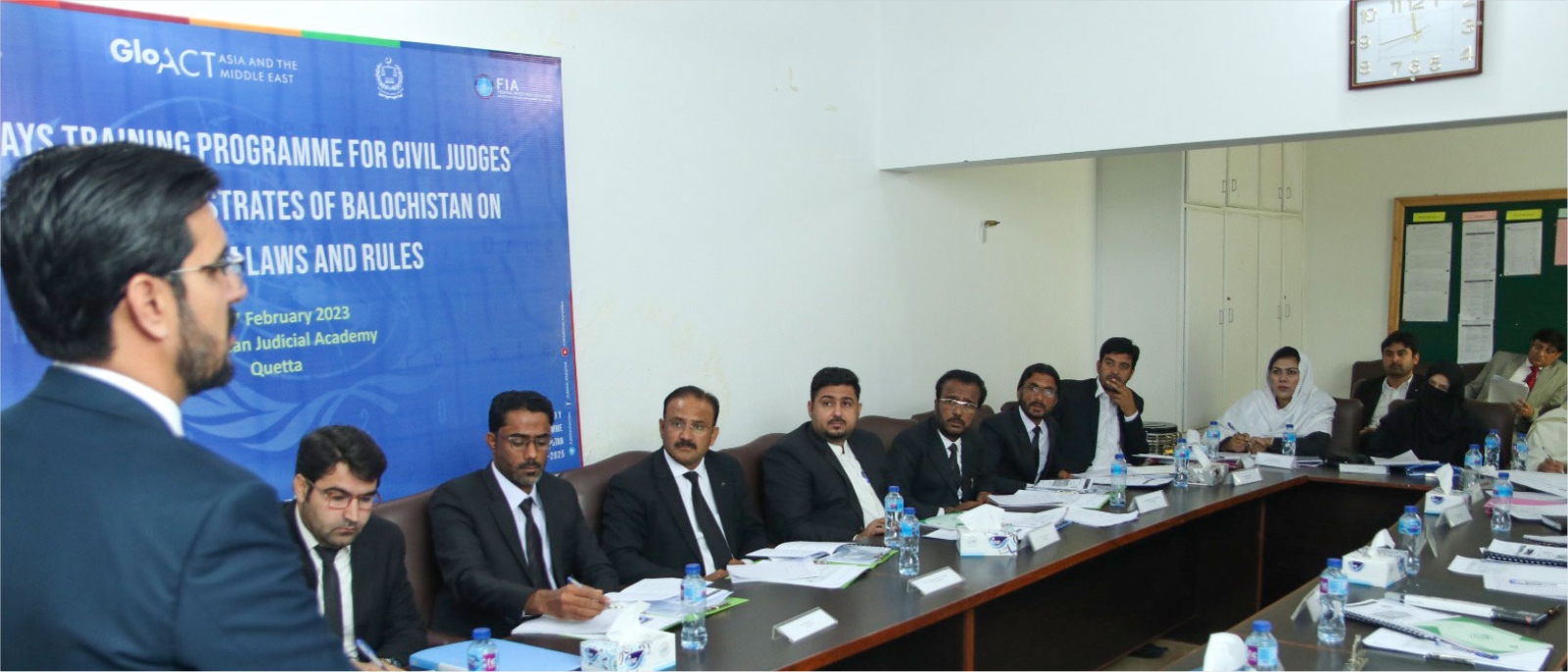
06 March 2023, Quetta – Pakistan shares international borders with the I. R. Iran to the west and Afghanistan to the north. Balochistan is a source and transit region for trafficking in persons (TIP) and smuggling of migrants (SOM). Between Patiskan and the I.R. Iran, Taftan is the principal land route for movement across the border. Every day authorities receive thousands of deportees from the I.R. Iran, which were intercepted in the I.R. Iran and Turkey on their way to Europe.
To strengthen the government's response to these challenges and counter TIP and SOM, UNODC, under the framework of GLO.ACT Asia and the Middle East, organized a three-part training series for 60 judicial officers in February and March 2023 at the Balochistan Judicial Academy in Quetta.
The sessions allowed the judicial officers to examine, in greater depth, areas in which they faced challenges or seek further clarification where there were uncertainties while dispending cases related to TIP or SOM and related crimes. It also allowed attending judges to gain additional insight into the specific issues concerning human trafficking and migrant smuggling and the differences between the Prevention of Trafficking in Persons Act, 2018, and the Prevention of Smuggling of Migrants Act, 2018.
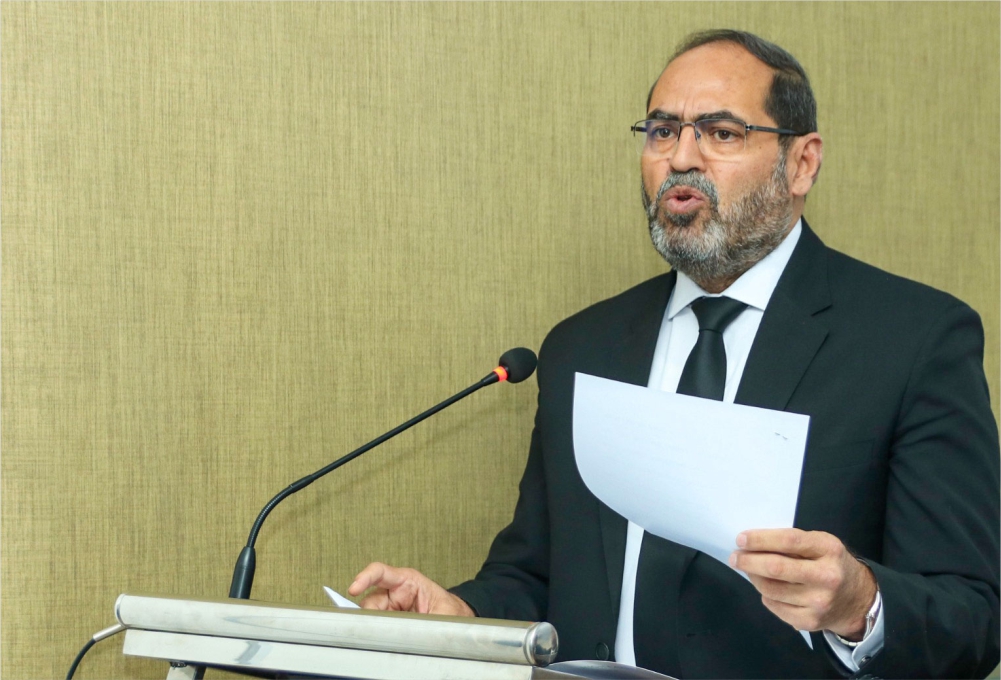
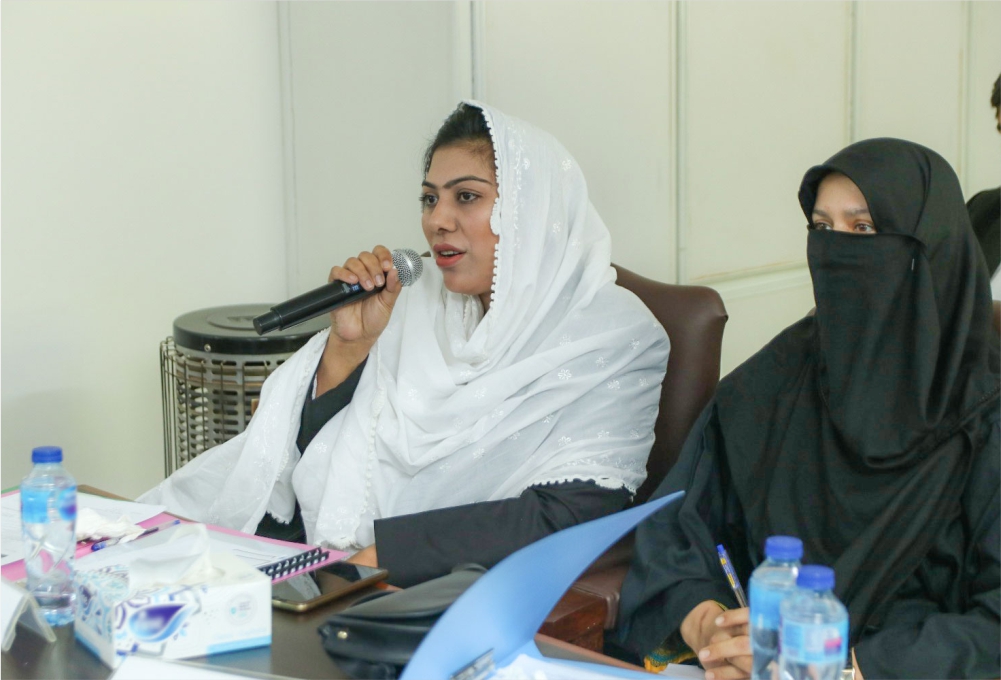
Muhammad Qasim Mandokhail, UNODC National Expert, welcomed the participants and briefed them about the objectives of the sessions. He informed that UNODC, with the help of the Federal Investigation Agency, has been working for many years to combat these two organized crimes in Pakistan. After that, the Government of Pakistan enacted "The Prevention of Trafficking in Persons Act, 2018" and "The Prevention of Smuggling of Migrants Act, 2018". These laws align with the international legal framework and are based on United Nations model laws on TIP and SOM.
Mr Mandokhail further spoke about the relevant provisions of TIP and SOM and the Acts' by-laws. He further explained the importance of electronic evidence and discussed the provisions of Qanun-e-Shahadat 1984, whereby electronic evidence has been declared admissible and primary evidence.
Mr Muhammad Shahid Shafiq, District and Sessions Judge and senior faculty member at the Sindh Judicial Academy, spoke about the international legal framework and discussed in detail the relevant provisions/articles of the United Nations Convention against Transnational Organised Crime (UNTOC). He highlighted and discussed the relevant articles of the Protocols thereto. He also spoke about the United Nations Convention on the Rights of the Child and the United Nations Convention on the Elimination of all Forms of Discrimination against Women. Judge Shafiq also mentioned judicial cooperation, which focused on mutual Legal assistance and said that the court might secure and gather such evidence using the mutual legal assistance framework during the investigation and trial.
He spoke about the role of magistrates when dealing with cases of human trafficking and migrant smuggling. He discussed in depth the non-criminalization provision embedded in both laws and addressed the concept of victim protection.
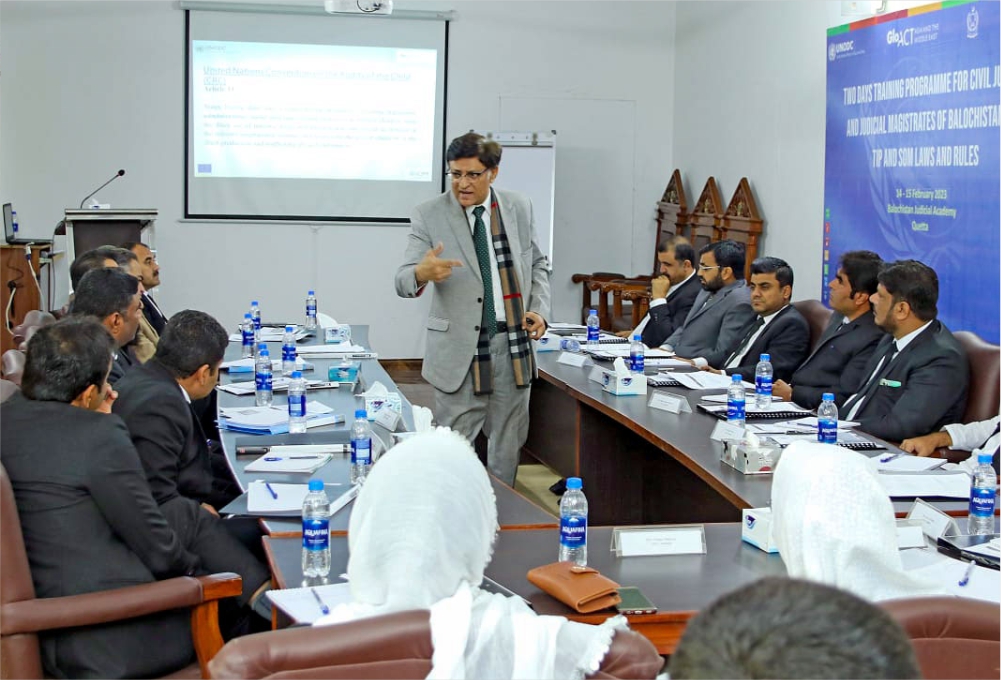
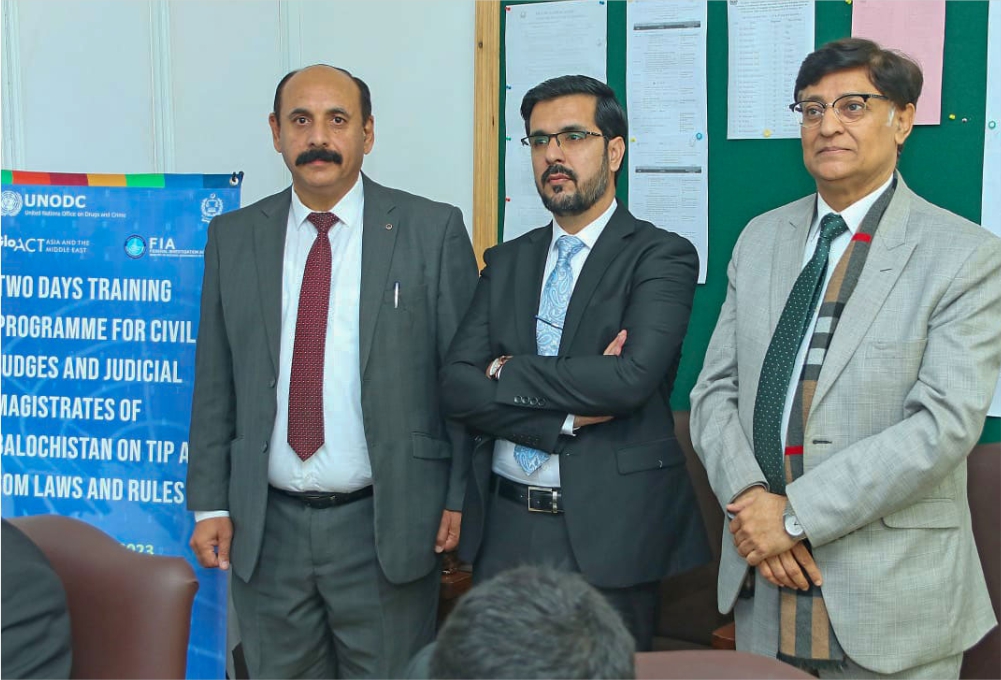
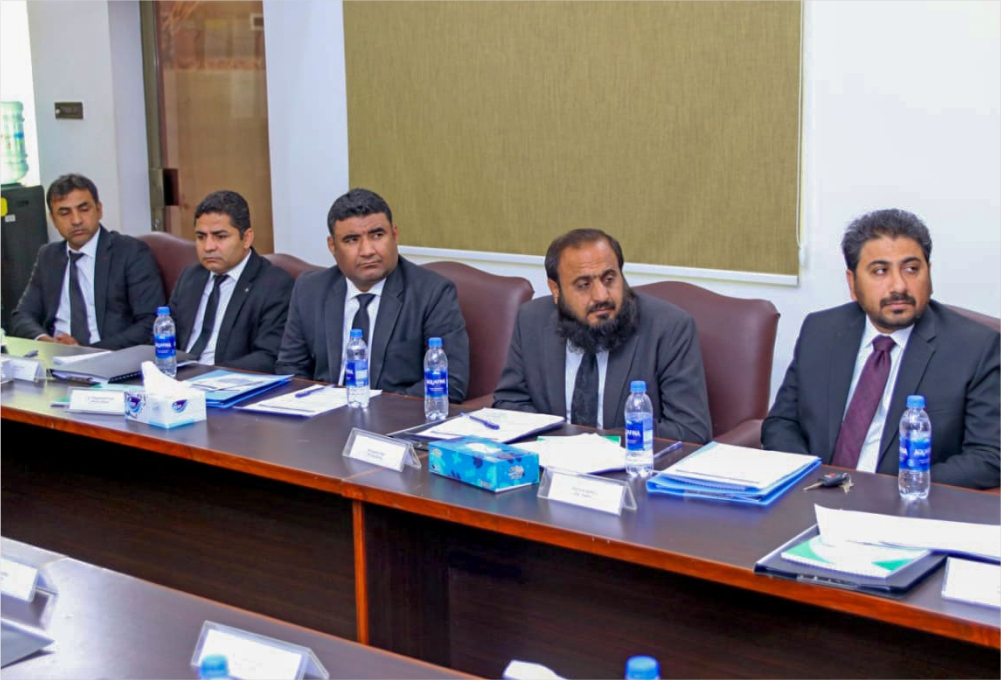
He also highlighted the role of judicial magistrates in sentencing. He noted the special provisions within the Acts, which enable magistrates to award sentences up to 14 years and fine up to two million Pakistani rupees. He spoke about the quantum of sentences and discussed in detail the importance of judgment writing considering judgments of apex courts.
The trainers assigned a few exercises to the participants to bring more clarity to the subject. They were divided into groups, and different assignments were given. After about 30 minutes of group discussion, they presented their point of view. The purpose of the group exercise was to compel them to read relevant rules and identify each stakeholder's role and responsibility during the investigation and in court proceedings while dealing with the TIP and SOM cases. The participants perused and identified the relevant rules that deal with the responsibility of the investigation officer and the trial court.
Meanwhile, Mr Manzoor Ehsan, Director of FIA Balochistan, spoke about the working of FIA and the efforts they make to control human trafficking and migrant smuggling crimes. He explained the inquiry process and shared with the judicial officers the difficulties they usually face during inquiry and investigation. He further shared that during inquiry and investigation, they seek assistance and cooperation from other departments and agencies such as local police, levies, coast guards, etc. He shared that every criminal justice system stakeholder needs to understand these two newly enacted laws more, and academies like the judicial academy may play an effective role in implementing these laws.
In the last training, the Hon'ble Justice Naeem Akhtar Afghan, Chief Justice of Balochistan High Court, and five Hon'ble Judges of the High Court visited the Balochistan Judicial Academy. During their visit, they observed the training proceedings. The Hon'ble Chief Justice appreciated the trainers and training method in which they involved every participant and provided the opportunity to speak and express their point of view.
When asked about the training, Sana Manzoor, Civil Judge/Judicial Magistrate, Winder District Lasbella, said: "The experience of the present training on TIP and SOM was excellent. All the questions relating to the said laws in the judges' minds were cleared. The trainers were excellent, especially the worthy Shahid Shafiq and Qasim Mandokhail have excellent approaches to said laws and successfully conveyed the required knowledge."
Mr Hizbullah, Civil Judge/Judicial Magistrate, Sinjavi District Ziarat, shared his views, stating: "I do believe that the training session changed our minds. It is now clear that people who were considered accused and were put on trial are victims."
Ms Samina Nasreen, Civil Judge/Judicial Magistrate XII Quetta, said: "In this training, I became aware of the trafficking in person and smuggling of migrants, the difference between them, and the role of the court while protecting the victim."
Trainers included Muhammad Qasim Mandokhail (UNODC legal expert), Muhammad Shahid Shafiq (District & Session Judge), and Manzoor Ehsan (Director FIA, Quetta). Mr Nazar Kakar (Advisor Balochistan Judicial Academy) and guest speakers.
The Global Action against Trafficking in Persons and the Smuggling of Migrants – Asia and the Middle East (GLO.ACT-Asia and the Middle East) is a four-year joint initiative by the European Union (EU) and the United Nations Office on Drugs and Crime (UNODC), implemented in partnership with the International Organization for Migration (IOM) in five countries: the Islamic Republic of Afghanistan (Afghanistan), the Islamic Republic of Iran (I.R. of Iran), the Republic of Iraq (Iraq), the Islamic Republic of Pakistan (Pakistan). GLO.ACT-Bangladesh is a parallel initiative supported by the EU and IOM.
The project builds on a global community of practice set in motion in GLO.ACT 2015-2019 and assists governmental authorities and civil society organizations in targeted, innovative, and demand-driven interventions: sustaining effective strategy and policy development, legislative review and harmonization, capability development, and regional and trans-regional cooperation. The project also provides direct assistance to victims of human trafficking and vulnerable migrants through the strengthening of identification, referral, and protection mechanisms. The project is fully committed to mainstreaming Human Rights and Gender Equality considerations across all of its activities.
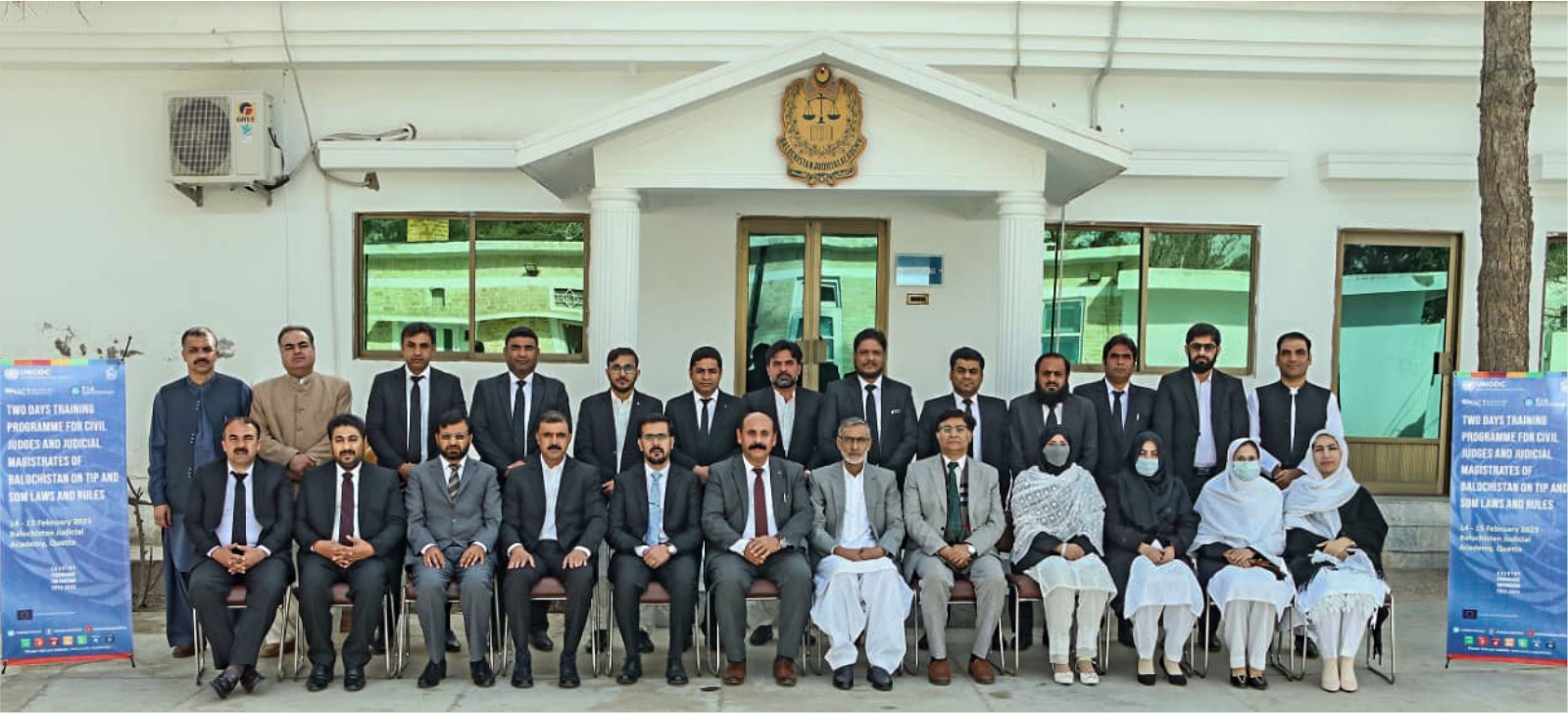
The project is funded by the European Union.
For more information, please contact:
Ms. Shahida Gillani, National Project Officer
Email: Shahida.gillani@un.org
For more information, please visit:
https://www.unodc.org/unodc/en/human-trafficking/glo-act2/index.html
Email: glo.act@un.org
Twitter: @glo_act